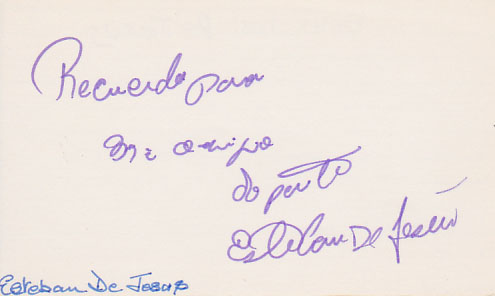
Eteban De Jesus
World Lightweight Champion
1976 - 1978
|
|
ESTEBAN De JESUS
b. August 2, 1951
d. May 11, 1989
|
World lightweight champion Esteban De Jesus has nicely signed and inscribed this 3x5 card in dark violet flair pen ink... An exceedingly rare autograph in any form due to his incarceration and untimely death in 1989
measures: 3 x 5"
condition: excellent
$575
$15 insured shipping
|
Professional Career Next came his first international fight, in Caracas against the future 4 time world title challenger Leonel Hernandez. De Jesus won that fight by a decision in 10, in what was the start of a 4 fight tour of Venezuela. That Venezuelan campaign ended with a ten round decision loss against former world champion Antonio Gomez, also at Caracas. 1972 was pivotal for De Jesus' career. He won six fights in a row, including a 12 round knockout win in a third fight with Marquez, and a ten round decision over Doug McClendon. Despite all those wins, he was virtually an unknown boxer to most boxing fans. That changed quickly in his last fight of '72, against the undefeated new world's Lightweight champion Roberto Durán, at the Madison Square Garden arena. In a televised bout that marked the beginning of the Duran-De Jesus trilogy, De Jesus dropped Duran in round one and went on to inflict Duran's first defeat with a ten round decision. In 1973, he was rewarded for his efforts, receiving a chance to challenge Ray Lampkin for the regional, United States lightweight belt. he became the United States' champion by beating Lampkin by a 12 round decision. Then, he beat Johnny Gant, by a ten round decision, and Raul Montoya, also by decision in ten. Then, there was a rematch in New York with Lampkin, whom he beat again, by a decision. He finished '73 with a first round knockout win over fringe contender Al Ford. He began 1974 by knocking out former world Jr. Welterweight champion Alfonso Peppermint Fraser in 10 rounds in San Juan, after which he traveled to Panama City to receive his first world title shot, and at the same time, face Duran in the second fight of their trilogy. He once again dropped Duran in round one, but this time Duran rebounded and dominated the bout, retaining the title by a knockout in eleven rounds. He recovered from that defeat with two more wins before the end of the year. In 1975, he went up in weight briefly, and after beating Jesse Lara by a knockout in three, he returned to Panama City to challenge Colombia's Antonio Cervantes for the world's Jr. Welterweight title, losing by a 15 round decision. He beat Rudy Barros by a knockout in five to end that year, and he started 1976, by beating Valentin Ramos by a knockout in two. Next came his third world title try, when the WBC's world Lightweight champion Ishimatsu Suzuki of Japan traveled to Puerto Rico to defend his title against De Jesus. The third time proved to be the charm for De Jesus, who won the world title by beating Suzuki by a 15 round decision. Then, he retained the title against Hector Medina by a knockout in seven. De Jesus as a world champion started dabbling in drugs, an element which would later threaten to ruin his life, and definitely changed it. In 1977, he retained the title against Buzzsaw Yamabe by a knockout in six, and against Vicente Mijares Saldivar by a knockout in eleven. 1978 began with the third and final chapter of his trilogy with Duran. In a title unification bout in Las Vegas which displayed Duran's talents at the peaks of its powers, Duran systematically broke down Dejesus that resulted in a 12th round knockout. De Jesus rebounded with three wins before the end of that year, including one over former world title challenger Edwin Viruet. In 1979, he had two more wins, including one over Jimmy Blevins. After beating Jose Vallejo by a knockout in seven in San Juan to start 1980, he traveled to Bloomington, Minnesota, to challenge Saoul Mamby for Mamby's WBC world Jr. Welterweight title, in the major supporting event of the Larry Holmes-Scott Le Doux world Heavyweight championship bout's undercard. In what turned out to be his last fight, he was beaten by a knockout in thirteen rounds. His record was 57 wins and 5 losses, with 32 wins by knockout. After Boxing After returning to spend his last days with his family, De Jesus was visited by many celebrities, including hall of fame baseball player Orlando Cepeda, Salsa music superstar Cheo Feliciano and his old nemesis Duran himself. Duran hugged and kissed De Jesus and told his daughter to do the same. This event was witnessed by José Torres who said he was amazed to see Duran's compassionate gesture as he lifted De Jesus out of his bed and hugged him at a time when so little was known and so much feared about AIDS. Esteban De Jesús died one month after being pardoned at the age of 37. |